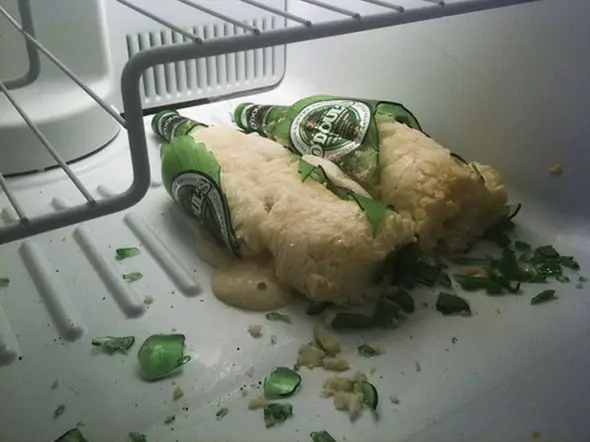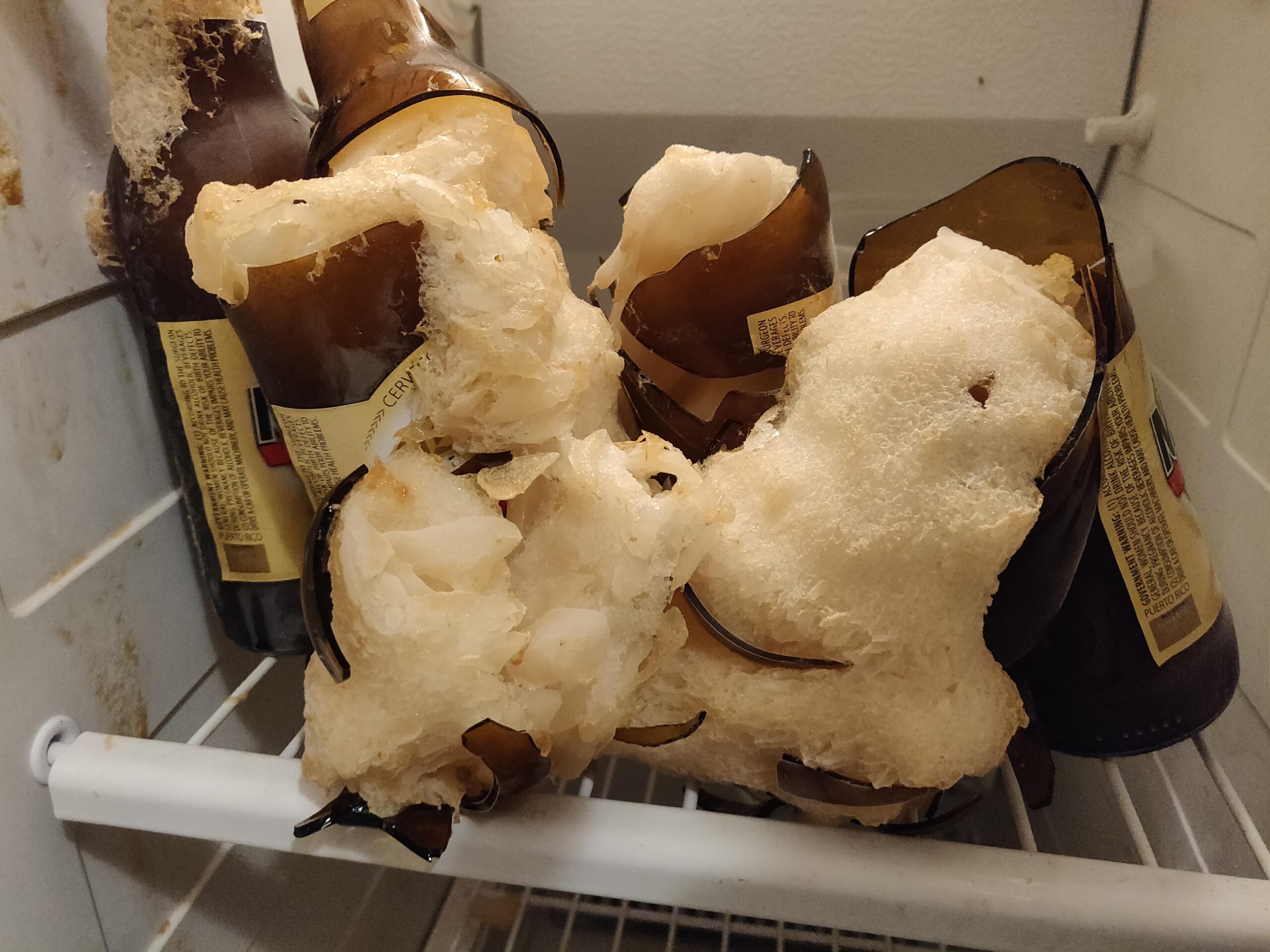Whether beer explodes depends on the storage method. There’s a misconception that beer can’t freeze. Unfortunately, many people must discover this is just a myth the hard way. While it takes beer longer to freeze than other substances like water, it will invariably freeze. Some variables, like the alcohol content, will affect how rapidly it will occur.
When exposed to temperatures “below 25 degrees Fahrenheit or in a freezer set at 0 degrees Fahrenheit, below freezing,” beer will freeze solid.
However, the liquor shouldn’t be allowed to fall at temps close to freezing because when this happens, bottles and cans will begin to explode. That means you should avoid putting a beer in the freezer to get it chilled quickly if you happen to forget about it.
Those in frigid climates need to ensure the places they store their beer, basements, and patio storage areas stay above freezing temps to avoid explosions. When it comes time for storage, if you’re unsure how to keep beer contained safely, it’s wise to do some research, particularly for anyone new to storage.
Many myths surround storing beer, making it difficult to separate fact from fiction. If you’re concerned about the credibility of the information, a priority is to check with a reputable resource like a liquor store. The shop owners will provide accurate details on storage methods and answer any other questions or concerns.
Let’s look at some myths about storing beer and supply the accurate details so you’re adequately informed.
Table of Contents
ToggleAre You Familiar With The Latest Beer Storage Myths? – Let’s Debunk These

Unfortunately, myths surface and get passed around on virtually any topic, including beer storage. The problem is it confuses people to the point they don’t know what’s true and, in many cases, follow poor advice. Often this leads to issues like exploding cans and bottles of beer, especially when kept in below-freezing temperatures.
We’ll look at several of the myths associated with storing beer to try to debunk people’s many misconceptions, including the fallacy of beer not being able to freeze. Review proper storage to ensure a fresh, delicious beer with each pour.
Beer should always be served frosty cold
The best flavor will be achieved when beer is served at a higher temp for all except for the pale ales. These are often served at a cool “35 to 40 degrees” and are flavorful when cold. Still, other beers will allow the drinker to experience each ingredient in full flavor by having them warmer. Cold will, in fact, cause the taste buds to “deaden” after time passes.
If you want to enjoy the entire experience, it’s essential to enjoy most beers, especially those with a high alcohol content above the 40-degree threshold. Usually, a refrigerator is kept around 38 degrees, still a little chilly for craft beer.
It doesn’t hurt the beer to keep them cool, but to enjoy them thoroughly, they’ll need to sit out for a little while to warm up. A better storage option is a cooler or another place with temperature control.
When bringing beer home, it must be kept at the same temp as the shop you bought it from
Many stores keep cases of beer at room temperature. With it being an organic product, the moment it’s brewed, it starts to deteriorate with heat, speeding things up. That eventually causes the flavor to diminish and odors to develop.
There’s a “recipe” for temperature deterioration following this rate: “It will keep for three days at 90 degrees if you were to keep it in the car on a hot day; 30 days at 72 degrees, and 300 days at 38 degrees.”
That essentially means you don’t want to keep it too hot or too cold but just right. The least amount of time it stays at room temperature is good. You should bring it home from the shop and immediately put it in a cooler or the fridge, whichever you prefer.
Allowing beer to become warm will cause it to “skunk.”
The actual cause of beer skunking is light, not heat. When light hits beer, it creates a chemical reaction that releases sulfur compounds. These are often found in bitter hops, and the sulfur odor is reminiscent of a skunk’s spray. Virtually all beer on the market is brewed with hops meaning any could get that “skunk” if exposed to the sun’s rays.
If you want to avoid unpleasantries like this and improve your beer’s shelf life, it should be kept in a cool, dry, dark place. That will prevent the skunk altogether.
Bottled beer lasts longer
A lot of beer drinkers prefer to hold onto the bottles and drink from these instead of a can or glass, but these are less secure means for storage over the long term because they let the light in. An aluminum can disallows the potential for the nasty aroma we just discussed.
Amber bottles are better in protecting the liquor, but clear bottles are no protection unless you take the time to keep these in a cool, dark place at all times. Cans are also adequately sealed to keep air out. When a bottle is corked, it offers a decent seal more so than a cap, but in either scenario, there’s a slight space where the air has the potential to get in.
With oxidation comes a stale beer. The only beer that tastes better in a “stale or aged state” is a strong, dark ale, but most beer bought in a shop will not do well when it goes flat.
Conclusion
Even if beer is ideally stored, it doesn’t mean it will last forever. It’s a beverage and will eventually spoil. The suggestion is that beer lasts approximately eight months at most if kept, again, in a cool, dark area. If you homebrew or have a microbrewery, these have a brief shelf life if you hope for full flavor.
When you get accurate details for storage, you know it’ll be fresh and delicious with every pour. The only thing to do then is sit back and enjoy.

I am a passionate beer connoisseur with a deep appreciation for the art and science of brewing. With years of experience tasting and evaluating various beers, I love to share my opinions and insights with others and I am always eager to engage in lively discussions about my favorite beverage.
















